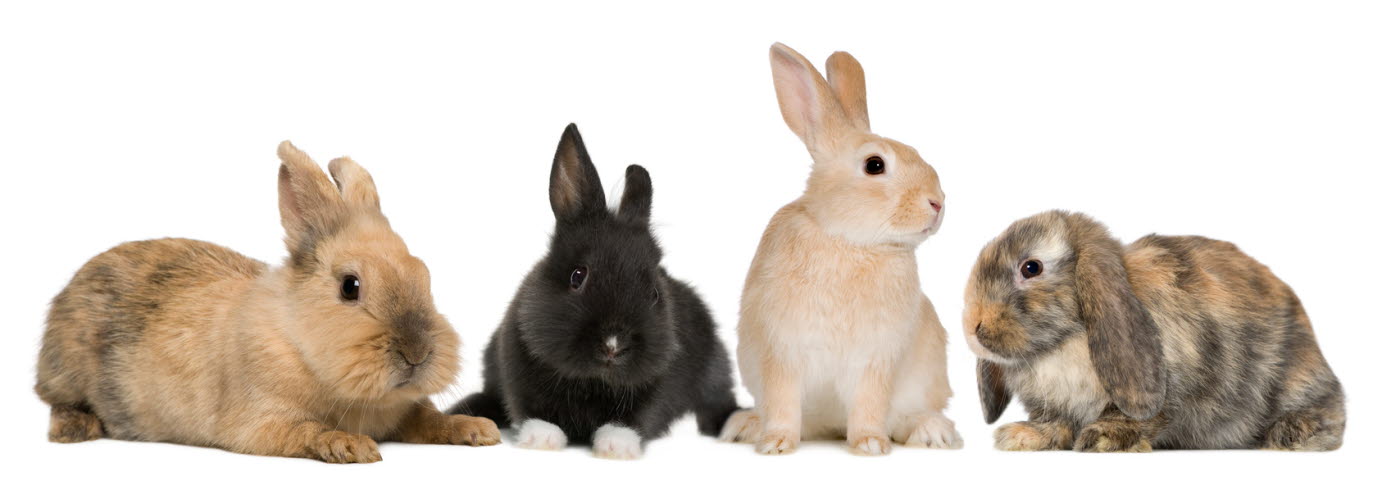Dental disease in rabbits

Dental disease is very common in pet rabbits, but it can often be difficult for owners to recognise the signs, especially in its early stages. This is because rabbits tend to hide symptoms of illness or pain until they are very unwell. It is also more difficult to perform a thorough dental check on rabbits (compared to dogs and cats), due to their smaller mouth opening.
What causes rabbits to develop dental disease?
Rabbits are likely to develop dental disease, if:
- They are fed an improper diet - rabbit teeth constantly grow to allow them to eat a natural (but abrasive) diet of grasses, bark and roots - if rabbits are not fed a diet that is high in fibre (mostly grass/hay and greens), their teeth will begin to overgrow.
- They don’t get enough sunlight - this leads to low vitamin D levels, which causes lower calcium levels and therefore weaker bones (including the jaw).
- They are born with abnormal jaws or tooth position - like humans, some rabbits can be born with naturally crooked teeth!
Dental disease can begin with overgrowth of the rabbit’s teeth, caused by insufficient wear or sometimes from jaw weakness. This overgrowth places pressure on the teeth, pushing them down into the jaw and slowly rotating them. The teeth gradually develop:
- Sharp spurs at the edges - these can cause painful ulcers on the rabbit’s cheeks and tongue.
- Abnormally long “root” tips within the jaw - these can press on the nasolacrimal ducts (the tear drainage system below the eyes) leading to conjunctivitis, or cause painful abscesses in the jaw.
What signs will rabbits with dental disease show?
Rabbits with dental disease may show signs such as:
- Weight loss
- Poor coat quality
- Picky/reduced eating
- Reduced or unusual faecal pellets
- Wet “dribbles” down their chin or neck
- Watery or cloudy eye discharge
- Nose discharge
- Jaw swelling
Can rabbit dental disease be fixed?
To diagnose dental disease in a rabbit, vets must perform a thorough dental exam. This involves using special scope and gag instruments to look inside the rabbit’s mouth, which may often require sedation or anaesthetic if the rabbit is feeling painful or nervous. In more severe cases, it’s recommended for the animal to have detailed jaw imaging by x-ray or CT scan.
Early-to-moderate dental disease may be treated with a dental procedure under anaesthetic to shorten and reshape the rabbit’s teeth, with any damaged teeth being extracted. Many rabbits require regular procedures thereafter to maintain their dental health long-term (as the teeth and jaw are permanently altered), and often permanent dietary changes. More severe cases that have developed jaw abscesses require surgical treatment, and long-term antibiotics.
Can I prevent dental disease in my rabbit?
Prevention of rabbit dental disease is best achieved by starting your rabbit on a high fibre, nutritionally balanced diet early in life. Read more on rabbit diets here, and make sure to ask your veterinary team for diet recommendations for your rabbit.
It is also recommended giving your rabbit daily access to the outdoors, to ensure they have adequate exposure to sunlight for adequate vitamin D production.
Good care early in life helps to ensure that your rabbit companion will remain happy and healthy for years to come!
